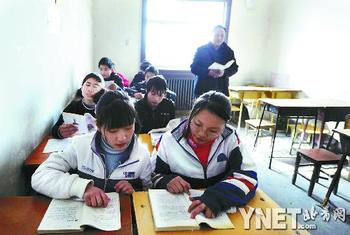Bad policies force migrant children out of school
|
|
|
The ninth grade at Ziqiang Experiment School |
At Ziqiang Experiment School, the number of ninth-graders has been slowly dwindling. A primary and middle school (grades 1 to 9), Ziqiang serves the children of migrant workers in Beijing. Now, only eight students remain, less than two-thirds of the 13-member class at the beginning of the school year.
But where did all the students go? No one knows for certain. Why they chose to leave may be more easily explained.
Every student must pass an exam to enter a high school, but they are only allowed to take the exam in the place of their permanent residence. For the children of migrant workers in Beijing, not having a Beijing hukou (permanent residence permit) prevents them from taking the entrance exam and hinders their academic pursuits in Beijing. Instead, many choose to drop out during middle school.
Another option is attending a vocational high school. With poor reputations for their academic quality, vocational schools attract few students and are easy to get into. But migrant families still are disqualified for financial aid. As a result, some migrant workers allow their children to quit schools and start work at 15 or 16.
"Unlike the local children in Beijing, those kids in our school are not worried about the upcoming high school entrance examination," said Jiang Weiyi, a ninth-grade teacher at Ziqiang. "They are concerned about which path they should choose for the rest of their lives."
Since Ziqiang began providing middle-school education in 2000, just a small number of students have graduated. Despite showing talent, none of them could go to high school in Beijing.
"Some of our students who did well managed to enter vocational schools and finally landed technical jobs," said Principal Han Hai. "But most of them began work even before finishing."
Zhang Yuting is one of the eight students still in the ninth-grade class. She and her parents moved to Beijing from Gansu Province when she was 11. The best in her class, Zhang has the potential for high school and college, her teachers believe. But without a Beijing hukou, high school admission is impossible for her.
"I envy those local kids who can take the high school entrance exam," said Zhang, who wants to be a doctor. "They are striving to realize their dreams. But my dream has been taken away."
An increasing number of migrant workers want their children to pursue education because many jobs now have higher academic requirements. For some of them, it is a difficult decision whether to send their children back to their hometowns, where there is no one to look after them, to take the entrance exam.
Another student, Yu Wenyan, refused to be sent back to her hometown.
"If she starts to work after middle school like many of her classmates, it can be good for her because she will accumulate social experience," her father said. "Now I don’t know how to help her choose the right path for the rest of her life."
 0
0 







